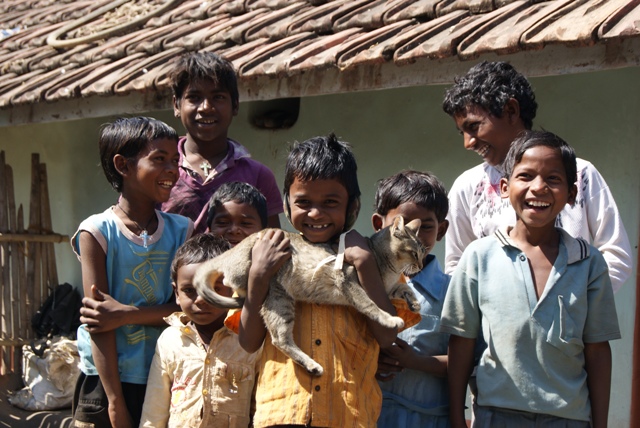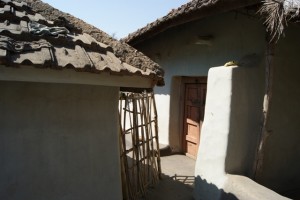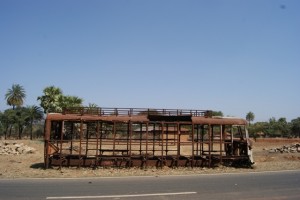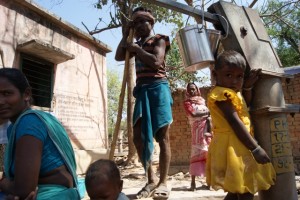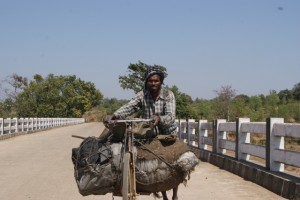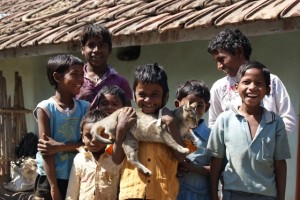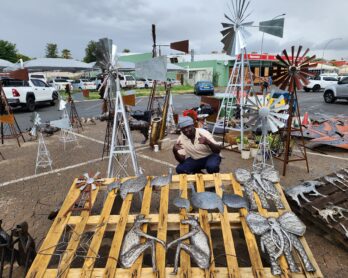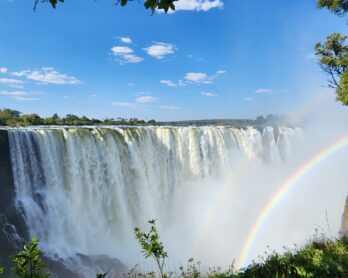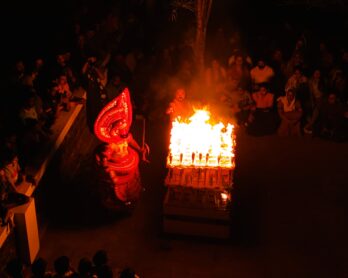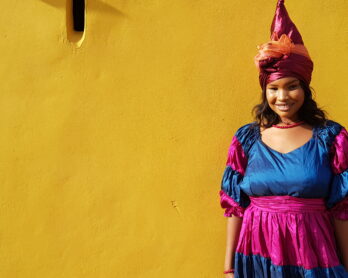As I entered through the bamboo gate, the pigeons fluttered up like a John Woo scene. I pointed this out to my cameraman who guffawed nervously. But we had to can some happy visuals for a CSR documentary and not action sequences with borrowed faces. All through the trip we were worried about filming in Dumka, an insurgent-infested outpost 300 km from Ranchi. Also it didn’t help much that just half an hour back we had passed by a bus burned bare by the Maoists – a grim warning to some invading corporate – which added to the prevailing sparky ambience.
In Ranchi, the capital of Jharkhand, Birsa Munda in his trademark mundu, occupies an overlooked town square. This folklore-hero and freedom fighter enjoys an almost James Dean-esque celebrity status among the tribals – for his fight as well as for his good looks. It also helped that he was an accomplished flutist and played the tuila – a one-stringed instrument made from pumpkin – well. Like the Hollywood icon, he was a hit with the ladies, had a number of consorts and lived a fleeting but full life. In a state with over 30 tribes and where tribal sentiments run deep, our driver, a Kujur, was a fan of Birsa.
“But the children today have no idea about him,” he lamented.
“What about the adults?” I asked.
“Oh, for them his memory is fast fading thanks to hadiya.”
I looked at him ready to laugh at the crack he had made at the effects of the local brew, a potent variant of rice wine. But he kept the straightest face as we headed out of Ranchi.
“There, look,” he pointed out a group of men squatting under a tree with heads burrowed between their knees, “that’s what I told you about.”
It was one of the numerous hadiya joints: under a tree, a woman with a ‘strictly business’ look was selling the wine at Rs 10 a glass. In a state where Rs 50 is the running daily wage, this was a fleece. Still money didn’t seem to bother any of the unfortunate laggards who had gathered headless – they seemed to be busy forgetting Birsa.
Midway to Dumka we passed by Purulia – the scene where weapons were dropped by Christian Nielsen, alias Kim Davy, who later claimed it was at the behest of RAW and MI5 – an episode which always finds new twists like ‘Pirates of the Caribbean’. It was from here that we felt that the serene landscape was as calm as ‘Lake Placid’. We reached Dumka by late afternoon and found that the shops were closed to a hartal call – yet another skirmish between ‘The Party’ – as the Maoists are called – and the police. A good thing about the hartal would be, we decided, is that everybody would be home. Unless they were Maoists. We decided to try our luck and proceeded to Masniya a village 30 km from Dumka where we had to shoot.
We drove under ragged clouds that drifted past, through villages that began and ended abruptly and between low lying hills, adults toiling it out on the merciless scree and playing children whom grievous malnourishment had made look more saurian than human. The women looked as sad and resigned as the men, their handsome faces expressionless. Everybody stared as we drove past horns blaring – we were told to keep honking as it was the police who came silently. On the way we passed by Saldoha – a village peopled by a stately bunch. These long-limbed lasses and lads were the descendants of Saul Pragana a king who ruled over 18 tribes. The village square was their apadana with a meeting in progress. My hearty ‘Johar’ (Jharkhand equal to ‘Namastey’) won their instant approval and smiles for photographs. Later I came to know that it was my cameraman’s panegyric on the hadiya which actually did the trick.
On the way there were clinics which we were told were run by the Maoists. The locals believe that the state and the central governments have abandoned them so they have turned to The Party for basic amenities, even law and order.
“The government and their cronies come to our state, steal from our land (read, mining) and lock us up,” said one youngster who rode up in a Yamaha RX 100 painted gleaming new. “And they say we are breaking the law.”
“But why don’t you take up some job?” I asked. “Write some tests…”
“Government jobs needs basic qualification,” he informed me with a sneer.
“Then why don’t you guys go to a college?” I did not want to give up an argument that was leading somewhere so easily.
“Where are the colleges, my friend?” He asked with a solemnity more insulting that indulging. Point taken, I asked for a photograph which was refused sternly but nicely – with a laugh, actually. Later I met an older guy who told me that the Maoists themselves were responsible for not having schools there: some of the schools which were used by the police and army men as barracks when they were hunted for the rebels were blown up and schools were run under trees in open grounds. This saw to it that the teachers almost immediately left unless they did not get any other job.
That the region was mineral-rich was doubtless. Madhu Koda, an ex-chief minister and an unscrupulous looter made an estimated Rs 4,000 crore just by signing mining leases to ravenous multinational corporations. I counted more than 20 sooty men ferrying coal in enormous distended containers made of plastic sacks stitched together, heavily balanced on bicycles. Each load would fetch Rs 400 in the local market. Somehow I failed to feel indignant at this illegal ravaging of nature – what was Rs 400 against 4,000 crore!
At Masniya, Theophil Murmu the headman – who had to masticate on a bough protruding from his mouth before saying anything, otherwise a pleasant man – led us to the house with the fluttering pigeons. Neatly broomed courtyard, hanging corns of maize, a well from which we could draw up pellucid water – the charm of the whole scene was made more alluring by our hugely hospitable hosts. They were the parents of the girl who was a beneficiary of a livelihood programme funded by a corporate. She was now employed as a button-fitter in a garment factory in faraway Kerala.
She was talking on camera on how happy she was with her new job and newfound friends. The camera slowly pulls out to reveal this evocative testimonial being watched by the parents on the laptop. On cue, they would turn around, face the camera and share their happiness that their daughter was happy and making a new life for herself. Far away from the land of strife and starvation. This was my ‘Dumka shot’. It came out better than I expected because they meant every word they said.


